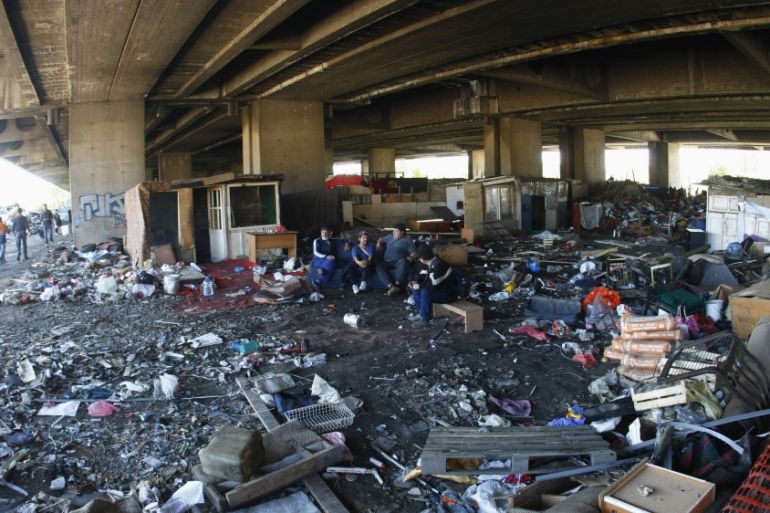Roma family takes eviction case to European Court of Human Rights
Ljubisa Selimovic’s fight against eviction order indicative of ‘institutional discrimination’ in Balkans, activist says.

In a social housing block on the outskirts of Belgrade, the Serbian capital, a Roma family is on the front line of a legal battle against home evictions.
Ljubisa Selimovic, a 47-year-old single father, lives with his three children and three grandchildren. When he received his latest eviction notice – the fourth of its kind in recent years – he decided to fight back at a European court.
Keep reading
list of 4 itemsDenmark’s tough laws on begging hit Roma women with few other options
Another Roma boy dies in police chase, marking grim pattern in Greece
‘My father didn’t beat my mother in a gypsy fashion-he just beat her’
“I was desperate,” he told Al Jazeera by telephone, explaining that one of his children, his 13-year-old son, is a minor.
“They’ve tried to kick us out four times,” he said, adding that they have nowhere else to go.
In the former Yugoslav country, Roma are among the most politically and economically marginalised demographic groups.
A 2011 census documented more than 140,000 Roma in the country, but unofficial estimates suggest the number is much higher.
Often confined to the impoverished margins of society, Serbia’s Roma minority is one of the most vulnerable groups impacted by home evictions, says the European Roma Rights Centre (ERRC).
The ERRC filed an emergency measure in the European Court of Human Rights (ECHR) on Selimovic’s behalf. In response, the eviction was delayed and has yet to be implemented.
The ECHR requested that Serbian authorities provide detailed information about alternative housing provided to Selimovic, according to court documents seen by Al Jazeera.
Serbian authorities offered to place Selimovic and his youngest son in separate homeless shelters, but the father refused.
“I will leave this home, but only if they don’t separate me from my son,” he said.
At the time of publication, the City of Belgrade’s Secretariat of Information had not replied to Al Jazeera’s request for a comment.
When evicted, Roma families are often denied access to suitable alternative housing and have little legal recourse in Serbia’s justice system.
In February 2017, UN Special Rapporteur on the Right to Housing, Leilani Farha, said housing laws fail to guarantee adequate consultation with families before evictions and do not inform citizens of their legal options to challenge eviction notices.
According to Human Rights Watch’s 2017 World Report, Serbia’s Roma minority is often forced to dwell in informal settlements and endure “discrimination and harassment in the areas of housing”.
‘Consequence of discrimination’
Jonathan Lee, a communications officer at the ERRC, said home evictions disproportionately affect Roma in Serbia.
With housing costs rising and utility expenses “soaring astronomically”, Lee said, the problems Roma in Serbia face have been compounded.
“The disproportional number of Romani people evicted in Serbia are a direct consequence of centuries of discrimination … It’s a consequence of anti-Gypsyism,” he told Al Jazeera.
“We see cases of institutional discrimination in every western Balkan country, but the worst cases seem to be in Serbia.”
Lee stressed that anti-Roma housing discrimination – including facing evictions and often living in de facto segregated communities – is part of a larger web of exclusion that marginalises Roma in Serbia.
![A Roma girl sits on the ground in a Belgrade slum in 2012 [File: Ivan Milutinovic/Reuters]](/wp-content/uploads/2018/06/6dab04127c7741798887811315e24861_18.jpeg)
Other problems include police harassment, difficulty obtaining legal residency documents, and racism in schools.
In May 2017, police officers in Belgrade tortured a Roma man and his wife after the pair reported their car stolen while in Austria, according to the ERRC.
The officers, who accused the couple of carrying out an insurance scam, waved a gun at the man and placed a bag over his head during interrogation. He was subsequently beaten with a leather whip, and officers threatened to have social services take their children into custody.
In a 2017 report, the ERRC found that 46 percent of Roma students surveyed across 31 schools had experienced various forms of discrimination.
‘Does not happen to non-Roma’
In some cases, Roma communities have been asked to collectively pay their utilities, such as electricity, and have had their power cut off when they were unable to.
In one such incident, authorities turned off the lights in Crvena Zvezda, a Roma settlement in the Serbian city of Nis, in August 2016 after residents failed to pay collective utility bills.
“This is something that does not happen to non-Roma in Serbia,” Lee added.
For Selimovic, who has lived in social housing for the last decade, the slew of eviction notices started several years ago when he lost his job.
![A Roma couple sit on the ground while they wait to be evacuated from a slum in Belgrade in 2012 [File: Ivan Milutinovic/Reuters]](/wp-content/uploads/2018/06/273ce6d4c5bd487685a44666a4a7ac8e_18.jpeg)
When his ill mother passed away shortly after, his rent was also raised from a previously discounted rate reserved for families with health hardships.
For the last three years, the family has only had limited access to electricity owing to his inability to pay the bills.
“This country does nothing for the people living here,” he said. “They (politicians) just care about themselves.”
Without his only income from odd jobs, Selimovic said he cannot afford to find alternative housing on his own. “The only money I manage to make goes to feeding my family,” he said.
“I’m putting all my hopes in the court … But if there is anyone out there who can help, we need it.”